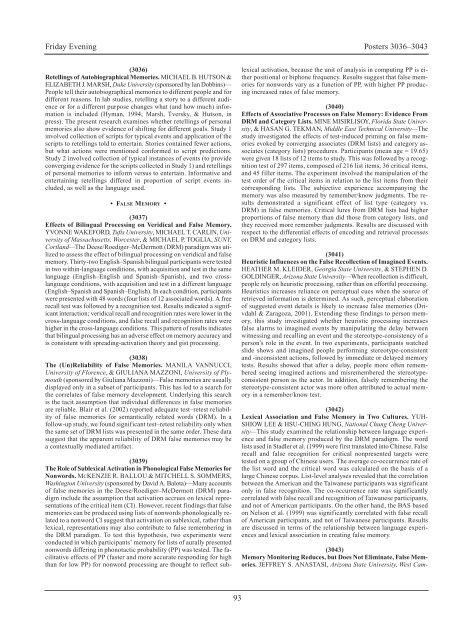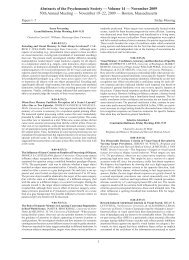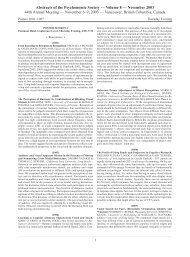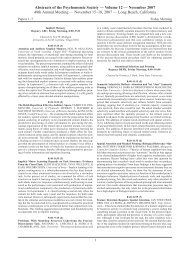Abstracts 2005 - The Psychonomic Society
Abstracts 2005 - The Psychonomic Society
Abstracts 2005 - The Psychonomic Society
Create successful ePaper yourself
Turn your PDF publications into a flip-book with our unique Google optimized e-Paper software.
Friday Evening Posters 3036–3043<br />
(3036)<br />
Retellings of Autobiographical Memories. MICHAEL B. HUTSON &<br />
ELIZABETH J. MARSH, Duke University (sponsored by Ian Dobbins)—<br />
People tell their autobiographical memories to different people and for<br />
different reasons. In lab studies, retelling a story to a different audience<br />
or for a different purpose changes what (and how much) information<br />
is included (Hyman, 1994; Marsh, Tversky, & Hutson, in<br />
press). <strong>The</strong> present research examines whether retellings of personal<br />
memories also show evidence of shifting for different goals. Study 1<br />
involved collection of scripts for typical events and application of the<br />
scripts to retellings told to entertain. Stories contained fewer actions,<br />
but what actions were mentioned conformed to script predictions.<br />
Study 2 involved collection of typical instances of events (to provide<br />
converging evidence for the scripts collected in Study 1) and retellings<br />
of personal memories to inform versus to entertain. Informative and<br />
entertaining retellings differed in proportion of script events included,<br />
as well as the language used.<br />
• FALSE MEMORY •<br />
(3037)<br />
Effects of Bilingual Processing on Veridical and False Memory.<br />
YVONNE WAKEFORD, Tufts University, MICHAEL T. CARLIN, University<br />
of Massachusetts, Worcester, & MICHAEL P. TOGLIA, SUNY,<br />
Cortland—<strong>The</strong> Deese/Roediger–McDermott (DRM) paradigm was utilized<br />
to assess the effect of bilingual processing on veridical and false<br />
memory. Thirty-two English–Spanish bilingual participants were tested<br />
in two within-language conditions, with acquisition and test in the same<br />
language (English–English and Spanish–Spanish), and two crosslanguage<br />
conditions, with acquisition and test in a different language<br />
(English–Spanish and Spanish–English). In each condition, participants<br />
were presented with 48 words (four lists of 12 associated words). A free<br />
recall test was followed by a recognition test. Results indicated a significant<br />
interaction; veridical recall and recognition rates were lower in the<br />
cross-language conditions, and false recall and recognition rates were<br />
higher in the cross-language conditions. This pattern of results indicates<br />
that bilingual processing has an adverse effect on memory accuracy and<br />
is consistent with spreading-activation theory and gist processing.<br />
(3038)<br />
<strong>The</strong> (Un)Reliability of False Memories. MANILA VANNUCCI,<br />
University of Florence, & GIULIANA MAZZONI, University of Plymouth<br />
(sponsored by Giuliana Mazzoni)—False memories are usually<br />
displayed only in a subset of participants. This has led to a search for<br />
the correlates of false memory development. Underlying this search<br />
is the tacit assumption that individual differences in false memories<br />
are reliable. Blair et al. (2002) reported adequate test–retest reliability<br />
of false memories for semantically related words (DRM). In a<br />
follow-up study, we found significant test–retest reliability only when<br />
the same set of DRM lists was presented in the same order. <strong>The</strong>se data<br />
suggest that the apparent reliability of DRM false memories may be<br />
a contextually mediated artifact.<br />
(3039)<br />
<strong>The</strong> Role of Sublexical Activation in Phonological False Memories for<br />
Nonwords. MCKENZIE R. BALLOU & MITCHELL S. SOMMERS,<br />
Washington University (sponsored by David A. Balota)—Many accounts<br />
of false memories in the Deese/Roediger–McDermott (DRM) paradigm<br />
include the assumption that activation accrues on lexical representations<br />
of the critical item (CI). However, recent findings that false<br />
memories can be produced using lists of nonwords phonologically related<br />
to a nonword CI suggest that activation on sublexical, rather than<br />
lexical, representations may also contribute to false remembering in<br />
the DRM paradigm. To test this hypothesis, two experiments were<br />
conducted in which participants’ memory for lists of aurally presented<br />
nonwords differing in phonotactic probability (PP) was tested. <strong>The</strong> facilitative<br />
effects of PP (faster and more accurate responding for high<br />
than for low PP) for nonword processing are thought to reflect sub-<br />
93<br />
lexical activation, because the unit of analysis in computing PP is either<br />
positional or biphone frequency. Results suggest that false memories<br />
for nonwords vary as a function of PP, with higher PP producing<br />
increased rates of false memory.<br />
(3040)<br />
Effects of Associative Processes on False Memory: Evidence From<br />
DRM and Category Lists. MINE MISIRLISOY, Florida State University,<br />
& HASAN G. TEKMAN, Middle East Technical University—<strong>The</strong><br />
study investigated the effects of test-induced priming on false memories<br />
evoked by converging associates (DRM lists) and category associates<br />
(category lists) procedures. Participants (mean age = 19.65)<br />
were given 18 lists of 12 items to study. This was followed by a recognition<br />
test of 297 items, composed of 216 list items, 36 critical items,<br />
and 45 filler items. <strong>The</strong> experiment involved the manipulation of the<br />
test order of the critical items in relation to the list items from their<br />
corresponding lists. <strong>The</strong> subjective experience accompanying the<br />
memory was also measured by remember/know judgments. <strong>The</strong> results<br />
demonstrated a significant effect of list type (category vs.<br />
DRM) in false memories. Critical lures from DRM lists had higher<br />
proportions of false memory than did those from category lists, and<br />
they received more remember judgments. Results are discussed with<br />
respect to the differential effects of encoding and retrieval processes<br />
on DRM and category lists.<br />
(3041)<br />
Heuristic Influences on the False Recollection of Imagined Events.<br />
HEATHER M. KLEIDER, Georgia State University, & STEPHEN D.<br />
GOLDINGER, Arizona State University—When recollection is difficult,<br />
people rely on heuristic processing, rather than on effortful processing.<br />
Heuristics increases reliance on perceptual cues when the source of<br />
retrieved information is determined. As such, perceptual elaboration<br />
of suggested event details is likely to increase false memories (Drivdahl<br />
& Zaragoza, 2001). Extending these findings to person memory,<br />
this study investigated whether heuristic processing increases<br />
false alarms to imagined events by manipulating the delay between<br />
witnessing and recalling an event and the stereotype-consistency of a<br />
person’s role in the event. In two experiments, participants watched<br />
slide shows and imagined people performing stereotype-consistent<br />
and -inconsistent actions, followed by immediate or delayed memory<br />
tests. Results showed that after a delay, people more often remembered<br />
seeing imagined actions and misremembered the stereotypeconsistent<br />
person as the actor. In addition, falsely remembering the<br />
stereotype-consistent actor was more often attributed to actual memory<br />
in a remember/know test.<br />
(3042)<br />
Lexical Association and False Memory in Two Cultures. YUH-<br />
SHIOW LEE & HSU-CHING HUNG, National Chung Cheng University—This<br />
study examined the relationship between language experience<br />
and false memory produced by the DRM paradigm. <strong>The</strong> word<br />
lists used in Stadler et al. (1999) were first translated into Chinese. False<br />
recall and false recognition for critical nonpresented targets were<br />
tested on a group of Chinese users. <strong>The</strong> average co-occurrence rate of<br />
the list word and the critical word was calculated on the basis of a<br />
large Chinese corpus. List-level analyses revealed that the correlation<br />
between the American and the Taiwanese participants was significant<br />
only in false recognition. <strong>The</strong> co-occurrence rate was significantly<br />
correlated with false recall and recognition of Taiwanese participants,<br />
and not of American participants. On the other hand, the BAS based<br />
on Nelson et al. (1999) was significantly correlated with false recall<br />
of American participants, and not of Taiwanese participants. Results<br />
are discussed in terms of the relationship between language experiences<br />
and lexical association in creating false memory.<br />
(3043)<br />
Memory Monitoring Reduces, but Does Not Eliminate, False Memories.<br />
JEFFREY S. ANASTASI, Arizona State University, West Cam-





